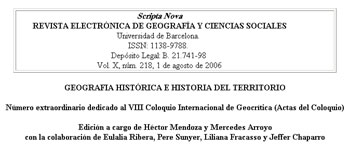Miguel Reale (1910-2006): an outline of planning in Brazil in the 1930s
Keywords:
geographical thought, authoritarism, State, planningAbstract
The Brazilian scenario during the 1920s and 1930s was characterized by the decline of the political-economic, agro-exporting system and the 1930 Revolution, with the consequent “elite purification”, leading to the 1937 coup (devised by Getúlio Vargas). The discourse for the modernization of the country then gains momentum, which, with regard to the territorial transformations and the geographical thought itself, is manifested in the creation of the Brazilian Institute of Geography and Statistics (Instituto Brasileiro de Geografia e Estatística – IBGE), and the first geography university degrees in Brazil. There is, thus, some dynamism of ideas that foment, from a territorial angle, the “progressive”, “modern”, authoritarian and anti-liberal feature, so recurrent in the history of ideas in Brazil. In this context, in 1932, the “Ação Integralista Brasileira”, a political movement with an authoritarian characteristic, founded by politician Plinio Salgado, arises. Its main intellectual exponent, the jurist Miguel Reale (1910-2006), would suggest a political-cultural project in which the allocation of productive resources for the territory, a national road system plan, the occupation of the “pioneering fronts”, the definition of the state order (in favour of a corporate federalism) and a modernization project for the industrial estate (forewarning of the model for import substitution), would anticipate the praxis of planning in Brazil, which would only mature after the technical planning of the military government (1964-1985).Downloads
Published
2007-05-02
Issue
Section
Articles
License
Los autores que publican en esta revista están de acuerdo con los siguientes términos:
- Los autores conservan los derechos de autoría y otorgan a la revista el derecho de primera publicación, cin la obra disponible simultáneamente bajo una Licéncia de Atribución Compartir igual de Creative Commons que permite compartir la obra con terceros, siempre que estos reconozcan la autoría y la publicación inicial en esta revista.
- Los autores son libres de realizar acuerdos contractuales adicionales independientes para la distribución no exclusiva de la versió de la obra publicada en la revista (com por ejemplo la publicación en un repositorio institucional o en un libro), siempre que se reconozca la publicación inicial en esta revista.





